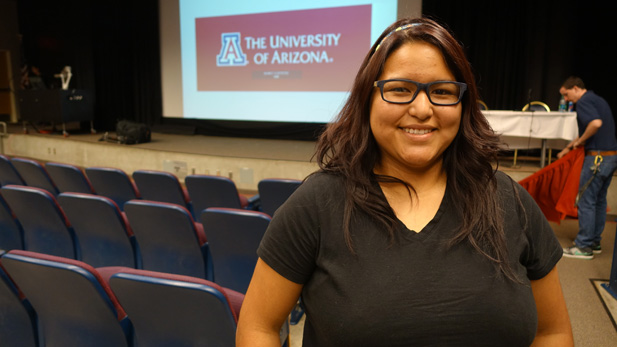 22-year-old Ana Rodriguez asked the Arizona Board of Regents to grant in-state tuition to DACA recipients like herself.
22-year-old Ana Rodriguez asked the Arizona Board of Regents to grant in-state tuition to DACA recipients like herself. Listen:
This story has been updated to reflect the number of people accepted to DACA and who have renewed their status
The Arizona Board of Regents decided unanimously Thursday that immigrants granted deferred deportation status by the Obama administration are now eligible for in-state tuition at the state's three public universities.
This makes college significantly more accessible to the more than 29,000 people with deferred deportation status in Arizona.
Until yesterday, the students, who call themselves dreamers, were considered non-residents and had to pay close to $30,000 a year to attend a public university. Now they’ll pay the in-state rate – which at the U of A will be $11,400 for new students next year.
The decision came two days after a Maricopa County Superior Court judge ruled on a 2013 lawsuit filed by then-Arizona Attorney General Tom Horne.
The case, brought against the Maricopa Community College system, said that by classifying dreamers as in-state students, the college was violating a 2006 voter-enacted law that banned undocumented immigrants from receiving public benefits.
Judge Arthur Anderson ruled on Tuesday that students with deferred status are lawfully present in the U.S.
Board of Regents President Eileen Klein said Anderson’s ruling established a new legal precedent in Arizona.
"And we intend to comply with the law," she said.
Regent Bill Ridenour told reporters that a policy change was overdue.
"All they want is an opportunity for good jobs...an opportunity for a better future for themselves and their families," he said.
Dreamer Korina Iribe, who cried when the regents announced their decision, said she will be directly affected by the decision.
“Currently I’m an online student," she said. "Because of the fact that I have DACA, I was given a scholarship with the stipulation that I go online because of the rates. Now I’ll have the opportunity to actually take classes on campus."
For the past several years, Iribe and other dreamers asked the regents for in-state status. Last month the board introduced a proposal to charge 150 percent of in-state tuition.
Despite Thursday's decision, regents will still vote on that proposal next month.
“That policy, while it did provide reduced tuition opportunities for DACA students, it also provides opportunities for other students who graduated from Arizona high schools," Eileen Klein said. "So that policy will proceed."
If the regents adopt that change, any student who spent three years in the state and graduated from an Arizona high school would pay the reduced rate even if they’re no longer considered a resident.
When that proposal was announced, 22-year-old Ana Rodriguez said it was a step in the right direction, but that she and other dreamers deserved in-state status.
Rodriguez said Thursday she was shocked to hear about the Board of Regent's decision. She is finishing her mechanical engineering degree at Pima Community College and now she can look forward to transferring to one of the state’s three pubic universities – but which one?
"I don’t know, a wild cat? Or a a devil? Or maybe NAU. I haven’t decided yet but definitely want to stay in state," she said.
Despite the ruling, the cost of college will still be a challenge for Rodriguez and other dreamers. They’re not eligible to receive any federal aid. Matt Matera, executive director of Scholarships A-Z, an organization that advocates for dreamers, said it’s still unclear whether or not yesterday’s decision means the students will be able to get state aid.
But with the issue of in-state tuition finally resolved, maybe that’s the next step.
That is, barring further legal action. Arizona Attorney General Mark Brnovich’s office issued a statement saying a challenge to the in-state tuition ruling is among options being considered.
AZPM Reporter Mariana Dale contributed to this story.

By submitting your comments, you hereby give AZPM the right to post your comments and potentially use them in any other form of media operated by this institution.